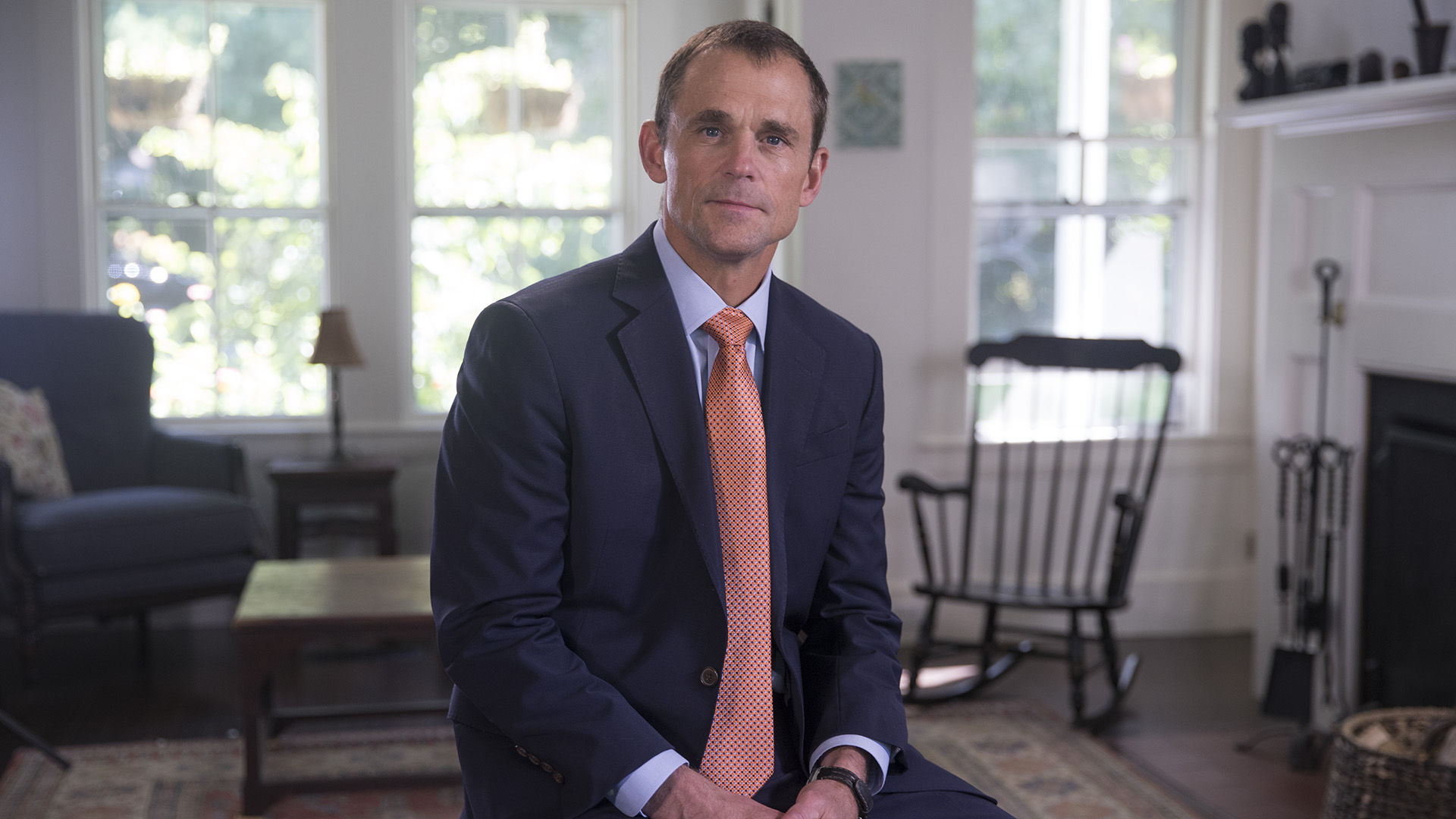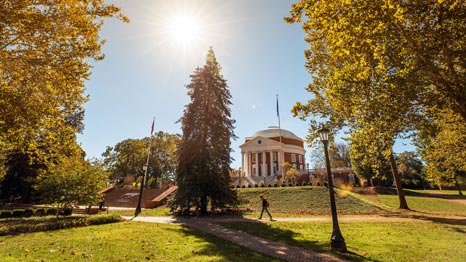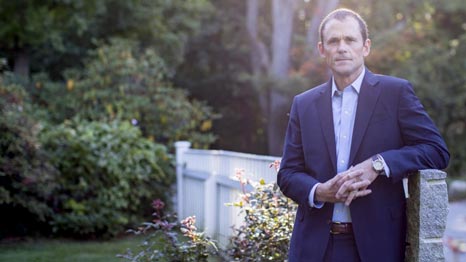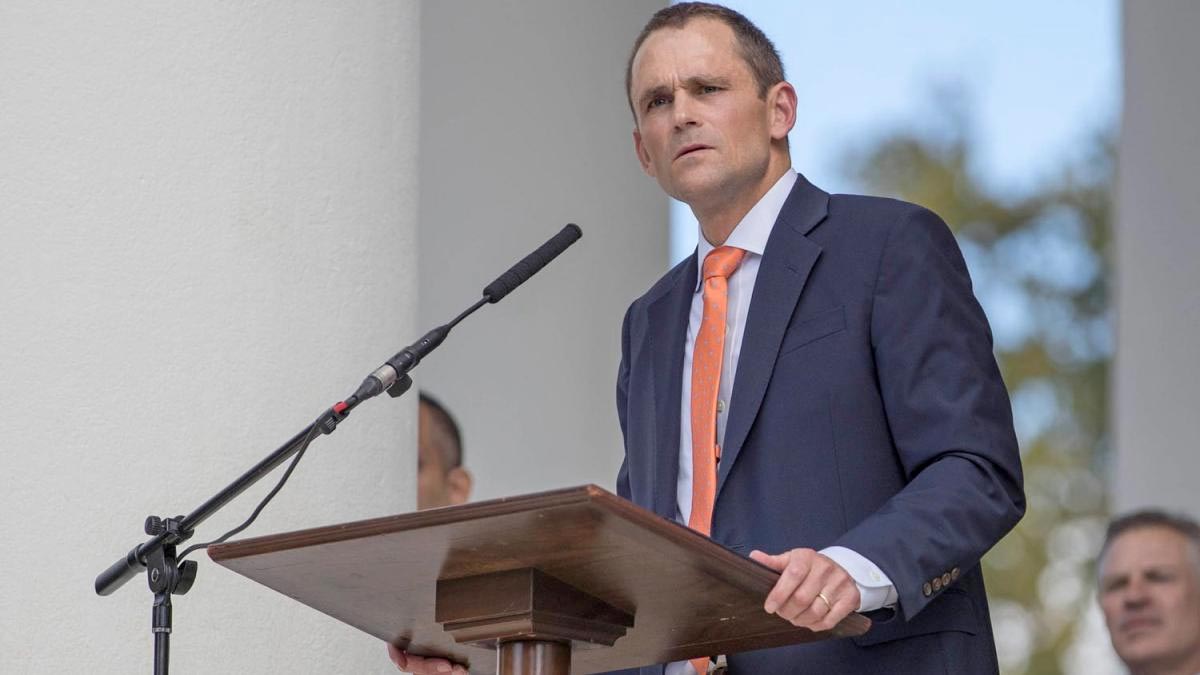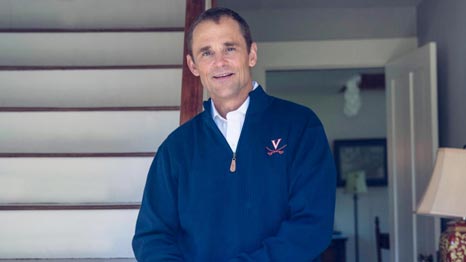James E. Ryan stands poised to return to Grounds as the next president of the University of Virginia after spending more than four years as dean of the Harvard Graduate School of Education. He and his wife, the former Katie Homer, and their four children know Charlottesville well; Jim and Katie Ryan met while students at the UVA School of Law, and he spent 15 years on the law faculty. During their time here, the Ryans grew as a family, cheered for Cavalier sports and got hooked on marathon running. For Jim Ryan, the time at UVA launched a lifelong passion for law and for education, and provided experiences that would shape his professional and personal life.
In a recent interview with UVA Today, Ryan addressed a variety of topics. The following has been edited for length:
On UVA’s special characteristics:
UVA has a unique combination of academic rigor and human decency. It’s a place where students and faculty are engaged, where they explore ideas and take ideas seriously. But it’s also a place where disagreements are handled civilly. It’s a place where people are kind to one another. It’s a place where people care about one another. And it’s that combination, that sense of shared enterprise, that everyone is there to learn, to progress and to give back.
On access to the University:
Ensuring that UVA and higher education generally are open to all talented students regardless of background and circumstance is one of the highest obligations UVA or any institution, especially public institutions, have. These really should be places of opportunity, and they should be places that welcome and make all who are there to feel welcome.
On diversity and inclusion:
Diversity and inclusion are among the highest responsibilities for institutions of higher education and, in particular, UVA. Diversity is a source of strength. It’s a source of vibrancy. And it’s part of an obligation to be open to all, and to welcome all. It’s not simply enough to assemble a diverse group of students or faculty. It’s important to take the next step and make sure all feel included. That’s an incredibly important mission, and one that is ever-evolving.
On his approach to the presidency:
I’ll begin by asking a lot of questions and by listening to the answers. I know some parts of the University really well. I know other parts less well. My first task is to make sure I understand not only the University, but the aspirations of those who are in it – all with an eye toward articulating a vision of the future of the University.
On the value of higher education:
I understand that there are some who question the value of higher education. I know from personal experience that higher education transforms lives. Even though you hear an awful lot about student debt, higher education remains one of the very best investments you can make in your own future. It is also absolutely critical and tied to participation in public affairs. So, to the extent we as a country want to encourage political participation, higher education is key.
I would be the first to recognize that not all institutions provide the same value. And one of the things I think UVA should be really proud of is that it offers one of the best values in higher education, and has been recognized by many.
On how higher education can improve:
I can think of three areas. The first is in pedagogy – what happens in the classroom. We are in a phase where the old style of standing up and delivering lectures is fading away, in part because students who come to college are expecting more hands-on experiences, expecting more opportunities to have interaction. Universities are moving that way, and I think it’s exactly the right way to go.
No. 2, I think that universities need to figure out ways to allow for more collaboration across schools and across departments. A lot of the problems that face the country and the world require an interdisciplinary approach. So to the extent that we expect universities to provide answers to real-world problems, we need to think about ways of allowing people to cross boundaries within the University.
Last, but not least, for public universities, we need to make sure that we take seriously our obligation to serve not just the commonwealth, but the country and the world. That’s a special obligation for public universities, which after all, are supported by the public. You do that not just through your research, which is absolutely important, but you do it through things like a school of continuing education, you do it through the hospital and health care system. You do it by reaching out with technology to enrich and better the lives of those who are not on Grounds.
On the quality of modern students:
Students at universities today are remarkable. They are inquisitive. They’re creative. They’re active. They are actually a force for positive change at universities. They are less bound by traditional disciplines, and more and more are pushing universities to cross disciplinary boundaries. They are more engaged than ever in the issues of the day, both locally and nationally.
On service to others:
I’ve always been drawn to the idea of public service. It was instilled in me as a kid. My father grew up quite poor in Paterson, New Jersey, one of eight kids. He went into the Navy and worked for what we call the telephone company for 30 years, and built a life for my mother and my sister and me. Despite all that he had to do to succeed, he always told my sister and me that the most important thing you can do is to give back. So from a very early age, I thought that service is the highest calling. To somehow contribute back to the community that has served you, that has been a guiding principle of my entire life.
On his passion for law and education:
What got me interested in law and education was my own experience. I was someone for whom the education system worked. I went to public schools in a small town in New Jersey. I had teachers who took an interest in me, and I was lucky enough to go to Yale [University] as an undergraduate.
That experience changed my life, but it also got me thinking, “Well, why did the system work for me when it failed so many others?” Trying to improve educational opportunities and outcomes has been a driving force for my life ever since. To me, it’s a way of giving back to a system that served me well.
On leading a complex, large organization:
The most important thing to do is to articulate a shared vision of the future, to use that vision to establish priorities, to have a team in place across the University that can carry out those priorities and make course corrections as needed.
On lessons in higher education leadership:
No. 1, it should never be about you. It should always be about the institution and the mission of the institution. To lead a university, you have to constantly keep in your mind, “What is the core mission of this university?”
The mission of UVA is quite clear. It’s about great teaching; it’s about great research; it’s about public service. Everything you do needs to be in advancement of that mission.
No. 2, it’s incredibly important to be honest and transparent. You need to make hard decisions if you are in a leadership position. You shouldn’t be shy about the necessity to make hard decisions. But you should always be willing to explain your reasoning, understanding that not everyone is going to agree with you, but they should at least understand your rationale.
Another lesson I’ve learned is that it’s really important to be visible. And it’s important to always recognize that it’s a privilege to be at a great university. So, spend time with students. Spend time with faculty. Recognize that you really have the great privilege of being around a remarkably talented, diverse, committed group of students, faculty and staff.
On inspirational figures:
My father was a huge source of inspiration for me - he worked incredibly hard. I was adopted as a kid. And my father used to always tell me, “I don’t know what to expect from you, but what I will expect is that you always try your best.” That’s something that parents often tell their kids, but my father really believed it. To him, the results didn’t matter. The only thing he would ask me was, “Did you try your best?” And if I told him I did, it was fine with him. I know that sounds really simple, but that lesson has lived with me ever since. I’ve passed it on to my own kids. Whenever I approach something new, it’s the only thing I’m trying to do. I can’t control the results always, but I can control my own effort.
My wife, Katie, and one of my best friends, Steve Gillon, who was a professor of mine, have always been sources of inspiration for me because of both their kindness to others and their belief in me personally, which sometimes exceeds my own belief in myself.
On family:
My wife and I met in Law School at UVA. She is a special education attorney. And she works part-time at a clinic at the Harvard Law School, and she also teaches a class on child advocacy at the Harvard Education School. She is a remarkable person who has a heart as large as her legal talent.
We have four kids. Our oldest, Will, is 20, and a sophomore at Harvard. Our second-oldest, Sam, is 18 and he is doing a gap year and will attend Yale. Both are athletic. They love soccer; they love skiing; they love surfing. They love to be outdoors. Our oldest son has gotten into rock climbing, which my wife has mixed feelings about.
Ben is our youngest son. He’s 16 and a junior in high school. He is a soccer fanatic. Our daughter, Phebe, is 11 and in sixth grade. She rules the roost in many ways. And she, like her brothers, is a huge soccer player, but she also is in musicals and plays the clarinet. And she is honestly, though I am biased, a delight.
On raising families:
I love the chaos of early morning. I love having breakfast with my kids. I love putting Phebe on the school bus on the mornings that she makes it. I tolerate driving her on the mornings that she doesn’t.
We try as much as we can as a family to have breakfast together and to have dinner together. It’s an opportunity, amidst the chaos, to at least take some time to check in with one another. I’m grateful that I’ve had that opportunity. They are moments that I completely cherish.
I think the thing that I’m most proud of is that our kids, each and every one of them, is kind. They’re kind to other people and that means the world to me.
On his previous time in Charlottesville:
The things I remember most vividly about being a law student at UVA initially was just the beauty of the Grounds, the Lawn in particular, the surrounding community of Charlottesville, the Blue Ridge Mountains. I thought and I still think it’s a breathtaking place.
I loved raising our family there. Our kids were and remain enormous UVA sports fans. We went to football games. We went to basketball games. We went to soccer games. We went to lacrosse games.
I also remember vividly making lifelong friends. I made some of my closest friends to this day.
The other thing I remember and think about a lot was participating in a group that was started by a friend of mine, Ted Small. The group was called Students United to Promote Racial Awareness. This was a multiracial group of law students brought together to talk about issues of race. It was a really formative experience for me because I had conversations about issues of race and diversity within a multiracial group for the very first time.
If you’ve ever done that, you know that at first it’s incredibly awkward, and you’re nervous and shy. But over time it becomes easier and easier. By the end of two years of participating in this group, which had become not just colleagues, but friends, it enabled me to have a much higher level of comfort talking honestly about issues of race. That has proven to me to be one of the most valuable experiences I’ve had.
On marathon running:
We really started training seriously for the Boston Marathon about eight years ago. It was all because of a running group started by Mark Lorenzoni, who owns the Ragged Mountain Running Shop with his wife, Cynthia. It was called Boston Bound. And we started participating in this running group, and for the first time took seriously the idea of preparing for a marathon.
It was being a part of that community that honestly motivated both Katie and me to do the kind of preparation you need to do if you want to run a marathon. So it was being able to run with friends that got us up at 5 in the morning on Wednesdays, or enabled us to go on 18-mile runs in the rain on a Saturday. It was one of the happiest experiences of our time in Charlottesville, to be a part of that group.
Media Contact
Article Information
September 15, 2017
/content/president-elect-ryan-talks-life-leadership-diversity-service-and-family

